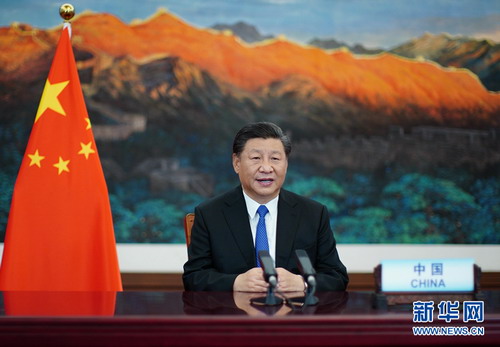
People’s Republic of China



On October 1, 2020, Chinese President Xi Jinping delivers a speech at the high-level meeting held in Beijing via videolink to commemorate the Twenty-fifth anniversary of the Fourth World Conference on Women.
Xi Jinping pointed out that women are creators of human civilization and drivers of social progress, and they have made extraordinary achievements across all fields of endeavor. In the ongoing fight against COVID-19, female medical and epidemic control workers, researchers, community workers and volunteers, braving danger and working around the clock, have fought at the front line of the battle. With their dedication and ingenuity, they have written heroic epics of protecting people and saving lives. They truly deserve our admiration. In China, at the height of the battle against COVID-19, women medical workers, in their tens of thousands, have shown the very best of the medical profession with their courage and hard work, and have kept the nation intact through difficult times with their devotion and sacrifice.
Xi Jinping stressed that over the past 25 years, the spirit of the Fourth World Conference on Women has unleashed many positive changes. The social status of women is significantly higher. Women are increasingly playing an important role of "supporting half of the sky", and the gender equality and women's empowerment are now important goals of the UN 2030 Agenda for Sustainable Development. The spread of COVID-19 epidemic worldwide has brought greater challenges to women. In both containing COVID-19 and promoting post-COVID economic and social recovery, it is particularly important that we address the special needs of women and deliver on the Beijing Declaration and Platform for Action.

Xi Jinping put forward four main steps.
First, the international community needs to minimize the impact of COVID-19 on women. Special attention should be paid to the health, social and psychological needs and working environment of frontline women medical workers. Women's and girls' rights and interests should be placed high on the agenda of both public health and work and production resumption, and any violations of women's rights and interests should be banned. Measures should be taken to improve social services, with priority given to special groups such as pregnant and postnatal women, and children. Special care may be given to women in difficulty such as those in poverty, old age or with disabilities. Efforts must be made to enhance benefits for women, address their concerns, and deliver results for their well-being.
Second, the international community needs to strive for genuine gender equality. Protection of women's rights and interests must become a commitment at the national level. As the world pursues a post-COVID recovery, new opportunities may be created for women to participate in decision-making and be more involved in national, economic, cultural and social governance. Prejudice, discrimination and violence against women should be eliminated, so as to make gender equality a social norm and moral imperative observed by all.
Third, the international community needs to ensure that women advance at the forefront of our times. In pursuing development, we need to protect women's rights and interests and improve their lives, and ensure that women's development goes hand in hand with economic and social development. An enabling environment must be created, in which women are motivated, their creativity is unleashed to the full, and they truly feel satisfied, happy and secure. Countries need to fully leverage the role of the government and mobilize all stakeholders to support women and help them live their lives to the full.
Fourth, the international community needs to enhance global cooperation in advancing women's development. China supports the UN in making women's development a priority. More should be done to eliminate violence, discrimination, poverty and other old problems and to address new challenges such as bridging the gender digital divide, so as to make women-related targets the early results of the UN's 2030 Agenda.
Xi Jinping stressed that equality between men and women is a basic state policy in China, noting the country has put in place a legal system comprising over 100 laws and regulations for fully protecting women's rights and interests. In China, the gender gap in compulsory education has been largely closed. Women account for over 40 percent of the country's workforce. Five years ago, Xi Jinping proposed a Global Leaders' Meeting on Gender Equality and Women's Empowerment. Now a host of proposals he put forward at the meeting for advancing global cooperation in the endeavor has been implemented. China is prepared to do even more to support the global cause of women's development. China also proposes the convening in 2025 of another Global Leaders' Meeting on Gender Equality and Women's Empowerment.
Xi Jinping pointed out at last that there is a long way to go and need to work really hard to build a world in which women are free from discrimination as well as a society of inclusive development. Let us work together and redouble efforts to promote gender equality and advance the global cause of women's development.


